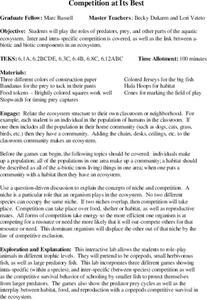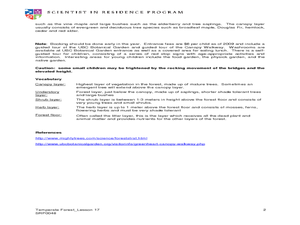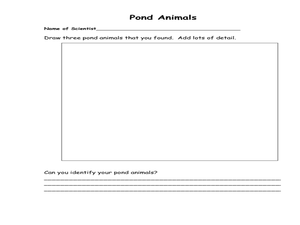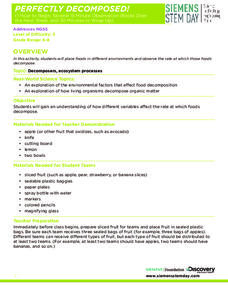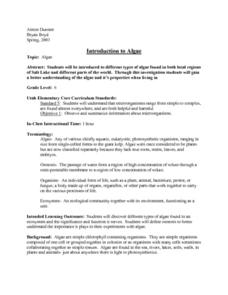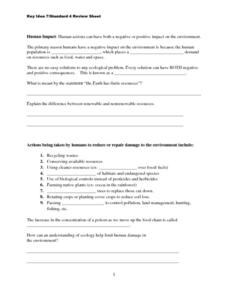Curated OER
Water Quality and Temperature
Students evaluate the effects of temperature changes on the metabolic rate of a clam. Conclusion questions are addressed which help students to process and articulate their experiences.
Curated OER
Wetland vs. Stream Macroinvertebrates
A link to a comprehensive macroinvertebrate guide gives you the information needed to prepare for this field study activity. Sample macroinvertebrates are collected from areas representing different environmental conditions. Junior...
NOAA
Stressed Out!
Are our oceans really suffering due to the choices humans make? The sixth and final installment in the volume of activities challenges research groups to tackle one of six major topics that impact ocean health. After getting to the...
Curated OER
How Do Plants and Animals Change the Environment Around Them?
If you have elodea and snails in your classroom aquarium, or if you have access to a pond with these organisms, your young biologists can set up a controlled experiment to determine how certain ecosystems respond in light and dark...
Curated OER
Peek at the Chesapeake!
Students research organisms that live in the Chesapeake Bay ecosystem. In this science lesson, students choose an organism and research how it is affected by humans. Students create a presentation of their findings.
Curated OER
Who Lives in a Wetland?
In this science worksheet, students list the names of 14 animals that live in a wetland. The animals are pictured and numbered. Students identify the animals and color the picture.
Curated OER
Compettion at its Best
Sixth graders role play predators, prey and other parts of the aquatic ecosystem. They show inter and intra-specific competition as well as the link between abiotic and biotic components in an ecosystem. Students play games about the...
Michigan Sea Grant
Invasive Species
Learners identify invasive species to the Great Lakes and analyze their impact on the ecosystem. Using photo cards with pictures and facts, young scientists work in small groups to match invasive species with their corresponding...
Curated OER
Salmon Life Cycles
Students list salmon life cycle stages in order, list three threats that salmon face throughout their lives, and examine important role native fish play in aquatic food chains throughout their life cycles.
Curated OER
Tree Top Canopy Field Trip
Students visit the Greenheart Canopy Walkway. In this environmental lesson, students experience a coastal rain forest ecosystem. Students interact and explore the different layers of the rain forest.
Curated OER
Science: Dissolved Oxygen and Water Quality Sampling
Students perform tests to determine the level of oxygen dissolved in water. After examining a table displaying the temperature and solubility of water, they examine the three stages involved in the test. Upon completion, students explain...
Curated OER
Precious Water: Is it a Need, a Right, or a Commodity?
Students determine whether water is a need, a right, or a commodity. For this water lesson, students investigate land and water ecosystems through activities. Students also discover water as a resource and energy source as they observe...
Curated OER
Determination of Overall Water Quality Using a Quantitative Macroinvertebrate Survey
Young scholars examine water samples from a local stream. They identify various types of macroinvertebrates found in that water ecosystem and perform a quantitative macroinvertebrate survey to determine the stream's water quality.
Curated OER
Pond and Pond Organisms
Students explore pond ecosystems. In this pond organism activity, students will use pond water and a plastic bad in order to locate and identify freshwater organisms. The activity is designed for younger grades, but includes an...
Discovery Education
Perfectly Decomposed!
We all know someone who won't eat the banana with a brown spot, the grape with a dimple, and the apple with a bruise. Scholars use different fruits to explore what happens when fruits really start to decompose. They set up an experiment...
Curated OER
The Wonderful World of Slugs
Examine a slug? Of course, what else would a 2nd grader do with it? Pupils use clues and go on a slug hunt, read a slug story, or make a cooperative group mural of a slug's habitat. While older learners catalog slugs, go on a slug hunt,...
Curated OER
Business Responsibility to Wetlands
Eighth graders discuss the responsibilities of businesses to protect local wetlands. In groups, they participate in numerous activities and create a model of a wetland to discover how it functions. They are given a quiz to end the lesson.
Curated OER
Exploring the Great Salt Lake
Third graders participate in a scavenger hunt, looking for things that are unique about the ecosystem in and around the lake. They observe and describe a variety of habitats and distinguish living and nonliving elements of...
Curated OER
Bahamian Terrariums
Sixth graders create a Bahamian terrarium. In this Bahamian ecosystem lesson, 6th graders watch a PowerPoint to see Bahamian biotic and abiotic factors. They bring in 2-3 items for their terrarium.
Curated OER
Introduction to Algae
Students explore different types of algae found in both local regions of Salt Lake and different parts of the world. They discover different types of algae found in an ecosystem and the significance and function it serves.
Curated OER
Standard 4 Review-Human Impact
In this human impact on the environment worksheet, students fill in the blanks to complete sentences about how humans have negatively affected the environment. They complete sentences about the actions taken to reduce and repair the...
Curated OER
Water Quality Survey
Students identify the differences in the water quality of a stream and complete water testing. In this water quality lesson students collect aquatic insects and identify them.
US Environmental Protection Agency
Non-Point Source Pollution
Investigate the different types of pollution that storm drain runoff carries into oceans, lakes, rivers, and streams with this class demonstration. Using an aquarium and an assortment of everyday items that contaminants like motor oil,...
Curated OER
Fish Fact Rummy
Seventh graders study and explore the base of PA game fish species and characteristics. In this cooperative learning lesson students create a fish fact game by researching information on certain species then play it.








